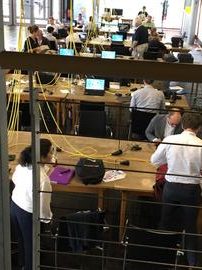The pace of software releases continues to get more frenetic, and we’re getting close to the point where daily releases are almost commonplace. At the same time, IT shops aren’t quite ready to turn the whole process over to automation.
That’s the word from the latest survey of 1,324 IT managers and professionals released by the Cloud Native Computing Foundation (CNCF), which finds release cycles have continued to speed up. Surprisingly, however, the use of automation to manage these cycles has slipped significantly. The percentage of those who release software daily, or even multiple times a day, has increased to 29% from 27% last year, the survey’s authors report. Weekly release cycles are still the most common (26%), but more than half of respondents (55%) release weekly or more frequently.
At the same time, the survey finds, there has been a shift away from fully automated cycles, which dropped to 33% from 40% in 2019. “This could mean that many organizations are not ready to jump to fully automated cycles because of the complexity of setting them up, or they wish to retain control over certain aspects of application deployment,” the CNCF authors speculate.
It’s not that IT professionals are going back to manual approaches — that would be about as stressful as stressful gets, especially among the close to one-third doing daily releases. Twenty-seven percent conducted releases manually in 2018, a number that now stands at 15%. Rather, a hybrid, semi-automated approach is increasingly preferred — rising from 25% two years ago to 46% today.
Continuous integration and continuous deployment (CI/CD) are also now commonplace, the survey shows. Eighty-two percent of respondents use CI/CD pipelines in production. The three most used CI/CD tools are Jenkins (53%), GitLab (36%), and GitHub Actions (20%).
Serverless also continues to gain a foothold in enterprises. Just under a third (30%) of respondents report using serverless technologies in production. Another 21% are evaluating serverless, and 14% plan to use it in the next 12 months. The majority of those using serverless technology (60%) use a hosted platform; 13% use installable software, and 22% use both. Service mesh also is gaining traction. This year, 27% of respondents use a service mesh in production, a 50% increase over last year. The survey’s authors expect this growth to continue, with 23% evaluating a service mesh and another 19% planning to use one in the next 12 months.
The survey also shows the growth of containers and container orchestration continues to accelerate to the point where it is, for all intents and purposes, everywhere, within every enterprise. At least 92% of respondents now say they use containers in production, a 300% increase from 23% in 2016, the first year the survey was conducted. This is also a significant year-over-year jump from last year when it was 84% and 73% in 2018.
The use of Kubernetes for orchestration is also ubiquitous. A total of 91% of respondents report using Kubernetes, 83% of them in production. This continues a steady increase in use in production from 78% last year and just 58% in 2018, CNCF reports.
There are lots and lots of containers now in use as well. A majority, 61%, now use more than 250 containers in their organizations. At the high end, those using more than 5,000 containers hit 23% in 2020, up from 11% in 2016
The most common use of containers is for proof-of-concept, test, and development environments, cited by 95% — a slight increase in each category from last year.
In terms of challenges, complexity joined cultural changes with the development team as the top challenges in using and deploying containers, both cited by 41% of respondents. Security (32%), which was second last year, slipped to third place, followed by storage (29%), and lack of training and monitoring (both at 27%).



